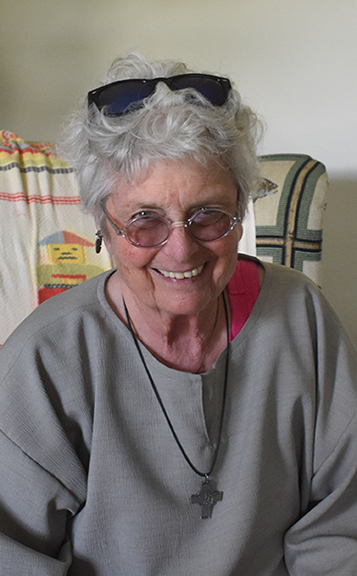FROM THE HERMITAGE
By sister alies therese
I learned from Elizabeth Lesser (The Seeker’s Guide, pg. 397), that “When Bishop Desmond Tutu introduced Nelson Mandela at his inauguration … he described him as a man who had obuntubotho … the essence of a human being. It speaks of humanness, gentleness, putting yourself out for others and being vulnerable, embracing compassion and toughness.” I would add that he was a man of shalom, one for whom things were as they ought to be. This would be our goal, our calling – our obuntubotho.
Lent has stirred us, challenged us, or gone quickly and unremarkably. Dionysius the Areopagite (5-6C CE), though his real identity remains unknown, as do his exact writing dates. He was known for ‘the rapt impotence of the mind before God,’ a spirituality of self-emptying. To discover the essence of the human person is to find this spirit of the Christ, the anointed One, and not to pay so much attention to ourselves. Did you come to know Jesus better this Lent? Did you discover what Jesus has done for you and what you are called to do for others? Are you willing to surrender all and enter the darkness?

Dionysius writes, “Entering the darkness that surpasses understanding, we shall find ourselves brought, not just to brevity of speech, but to perfect silence and unknowing.” And what good is that you ask? Well, in that silence, the fullness of God resides! He goes on, “Emptied of all knowledge, man is joined in the highest part of himself, not with any created thing, nor with himself, nor with another, but with the One who is altogether unknowable, and in knowing nothing, he knows in a manner that surpasses understanding.” Once we have let go of ourselves, entered into prayer and silence, we can move to be of some small service to others.
In the Pirke Avot 5:27 (a collection of rabbinic sayings compiled between 250 and 275 CE), though many sages lived long before and very little is known about them. They seem to “speak in one great sane voice of the necessity of enacting holiness and making prayer real in the service of others, bringing things into harmony.” (Wisdom of the Jewish Sages, Rabbi Rami Shapiro, 1993). Here is an example:
“Ben Hei Hei said: Effort is its own reward.
“We are here to do. And through doing to learn; and through leaning to know; and through knowing to experience wonder; and through wonder to attain wisdom; and through wisdom to find simplicity; and through simplicity to give attention; and through attention to see what needs to be done.”
What have you discovered that needs to be done? Wash, rinse, repeat … deal with your family issues, care for a sick neighbor, tutor a child, give money to a disaster fund or children’s hospital. You have found the one that works for you. Lent helps us find the one best suited to us.
Consider all the ways Jesus was a man of prayer and service! A man of shalom … everything about Him spoke of the deep relationship He had with the Father, so that he might do the work the Father had given Him. That gives us clues as to how we might grow. Even if we can list the seven deadly sins, the beatitudes, and the commandments, they are worthless if we do not want to allow shalom to fill our lives. We grow by prayer and action.
Mother Teresa, the saint of the slums, did not have an easy life. After she had gone back to God, folks opened her diaries and found great darkness and difficulty, and some even complained that she should ‘not be considered a saint.’ Really? No, it was her suffering and surrender that brought her ever deeper into God’s heart so that she might minister to those in distress. She gave us this to help remind us: “Loving as He loves, helping as He helps, giving as He gives, serving as He serves, rescuing as He rescues, being with Him twenty-four hours, touching Him in His distressing disguise.” It is that disguise that we have to pay attention to. Just as we could be ‘entertaining angels.’ we might also be serving Jesus in distress. There is still time to allow Lent to be moments of deep conversion and a new beginning, well on the way to shalom, on the way to obuntubotho.
Joseph Campbell, the philosopher, reminded Elizabeth Lesser that “from sacrifice comes bliss.” She says, “that is a liberating concept if learned from the real-life experience of following one’s heart.”
Blessings.
(sister alies therese is a canonical hermit who prays and writes.)
